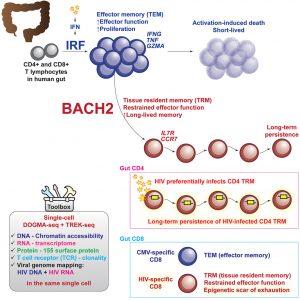Antiretroviral therapies have transformed HIV from a deadly infection into a manageable chronic condition. Yet despite decades of progress, a true cure remains elusive because HIV can persist in hidden reservoirs, especially in the gut. A new study reveals how the body’s own protective immune programming in the intestine inadvertently creates a sanctuary for HIV (Figure 1).
The gut is constantly exposed to pathogens such as bacteria, fungi, and viruses, and relies on specialised T cells that recognise and eliminate these invaders. To prevent excessive damage to fragile intestinal tissue, these T cells are programmed to become long-lived, resident cells with dampened inflammatory activity. The Yale team discovered that this process is orchestrated by a transcription factor called BACH2, which locks gut T cells into place, promotes their survival for decades, and curbs their inflammatory responses.
While this normally provides life-long protection, it also gives HIV a perfect hiding spot. Once the virus infects these long-lived T cells, they act as durable reservoirs, invisible to the immune system and resistant to current therapies.
The findings position BACH2 as a critical factor in HIV persistence. However, targeting BACH2 directly is not feasible, since it is essential for maintaining gut immune balance throughout the body. Instead, the researchers are now investigating how BACH2 is regulated, by neighbouring immune cells and gut microbes, as well as how similar mechanisms might protect HIV reservoirs in lymph nodes or even cancer cells.
By uncovering how the gut’s immune defences double as HIV’s safehouse, this study highlights new avenues for designing strategies to clear hidden viral reservoirs and move closer to a cure.
Journal article: Yulong Wei et al, 2025. Transcription factor BACH2 shapes tissue-resident memory T cell programs to promote HIV-1 persistence, Immunity.
Summary by Stefan Botha











